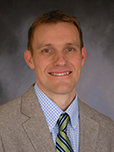All
The most recent articles, videos, blog entries, and more that have been added to ChristianUnion.org.
A Prayer and Fasting Devotional
“Where were you when I laid the foundation of the earth?
Tell me, if you have understanding.
Who determined its measurements—surely you know!
Tell me, if you have understanding.
Who determined its measurements—surely you know!
Christian Union Commissions Leadership Team
By Tom Campisi, Managing EditorEarly this summer, Christian Union introduced the faculty for its new leadership development ministry at Brown University.
 Christian Union's strategic focus on high-achieving students at universities like Brown requires a curriculum and faculty suitable for men and women of exceptional intellectual caliber. And Matt Woodard (pictured, left) and Justin Doyle—with seminary degrees and real-world work experience—exemplify this high standard for ministry faculty.
Christian Union's strategic focus on high-achieving students at universities like Brown requires a curriculum and faculty suitable for men and women of exceptional intellectual caliber. And Matt Woodard (pictured, left) and Justin Doyle—with seminary degrees and real-world work experience—exemplify this high standard for ministry faculty.Christian Union Commissions Leadership Team
By Tom Campisi, Managing EditorEarly this summer, Christian Union introduced the faculty for its new leadership development ministry at Brown University.
 Christian Union's strategic focus on high-achieving students at universities like Brown requires a curriculum and faculty suitable for men and women of exceptional intellectual caliber. And Matt Woodard (pictured, left) and Justin Doyle—with seminary degrees and real-world work experience—exemplify this high standard for ministry faculty.
Christian Union's strategic focus on high-achieving students at universities like Brown requires a curriculum and faculty suitable for men and women of exceptional intellectual caliber. And Matt Woodard (pictured, left) and Justin Doyle—with seminary degrees and real-world work experience—exemplify this high standard for ministry faculty.Nicole Mensa, Cornell '17, Founder of Non Profit in Ghana
by Eileen Scott, Senior Writer
From Africa to Ithaca, Nicole Mensa, Cornell '17, is serving people and sharing the message of God's love and compassion.
A native of Ghana, Nicole came to Cornell for a top-flight education and to experience another culture; because of her participation with Christian Union's leadership development ministry at Cornell, she is also growing in her knowledge of the Bible and passion for the Lord.
Day Twenty-one - Evening Devotional
As we continue our season of fasting together, I want to remind us of God’s purpose for us through fasting. Listen to Jesus’ words in Mark 7:15: “Nothing that goes into a person from outside can defile him, but the things that come out of a person are what defile him. If anyone has an ear to hear, he should listen!” In verses 20-23, Jesus continues to explain this mystery to His disciples by saying: “…What comes out of a person - that defiles him. For from within, out of people’s hearts, come evil thoughts, sexual immoralities, thefts, murders, adulteries, greed, evil actions, deceit, lewdness, stinginess, blasphemy, pride and foolishness. All these evil things come from within and defile a person.”
In our text today, the core problem of defilement is defined as what resides in the heart (things that come out), not things going into a person. Throughout Scripture, the heart refers to the center of one’s being, including the mind, emotions and will.
In our text today, the core problem of defilement is defined as what resides in the heart (things that come out), not things going into a person. Throughout Scripture, the heart refers to the center of one’s being, including the mind, emotions and will.
A Prayer and Fasting Devotional
“Now there were in the church at Antioch prophets and teachers, Barnabas, Simeon who was called Niger, Lucius of Cyrene, Manaen a member of the court of Herod the tetrarch, and Saul. While they were worshiping the Lord and fasting, the Holy Spirit said, "Set apart for me Barnabas and Saul for the work to which I have called them." Then after fasting and praying they laid their hands on them and sent them off. So, being sent out by the Holy Spirit, they went down to Seleucia, and from there they sailed to Cyprus.” - Acts 13:1-4
A Prayer and Fasting Devotional
“The end of all things is at hand; therefore be self-controlled and sober-minded for the sake of your prayers.” -1 Peter 4:7
I don’t know about you, but for me the pronouncement “the end is near” conjures up images of men with hand-lettered posters and megaphones emitting doomsday announcements from vans littered with judgment-themed Scripture verses slowly rolling down the street. To be honest, it’s not my favorite Gospel-themed message. Come to think of it, is it even Good News?
I don’t know about you, but for me the pronouncement “the end is near” conjures up images of men with hand-lettered posters and megaphones emitting doomsday announcements from vans littered with judgment-themed Scripture verses slowly rolling down the street. To be honest, it’s not my favorite Gospel-themed message. Come to think of it, is it even Good News?
A Prayer and Fasting Devotional
“Thus says the LORD: ‘Let not the wise man boast in his wisdom, let not the mighty man boast in his might, let not the rich man boast in his riches, but let him who boasts boast in this, that he understands and knows me, that I am the LORD who practices steadfast love, justice and righteousness in the earth. For in these things I delight,’ declares the LORD.” - Jeremiah 9:23-24
A Prayer and Fasting Devotional
Introduction
A rich relationship with God necessitates a spirit of gratitude and thankfulness for all He is, has done, and is continually doing. Every time a Christian sets aside time to pray and meditate on the Scriptures, thanksgiving needs to be part of the conversation with our amazing God.
Please enjoy this devotional video, or stream/download an audio version below, or scroll down to continue reading.
https://soundcloud.com/christianunion/a-a-thankful-heart-and-a
A rich relationship with God necessitates a spirit of gratitude and thankfulness for all He is, has done, and is continually doing. Every time a Christian sets aside time to pray and meditate on the Scriptures, thanksgiving needs to be part of the conversation with our amazing God.
Please enjoy this devotional video, or stream/download an audio version below, or scroll down to continue reading.
https://soundcloud.com/christianunion/a-a-thankful-heart-and-a
A Prayer and Fasting Devotional
Do you desire to be strong in God and His transformative power? To live a godly life, persevering in your devotion to Christ? To hear from God and to abide in Him fully?
Please enjoy this devotional video, or stream/download an audio version below, or scroll down to continue reading.
https://soundcloud.com/christianunion/a-seeking-god-day-and-night
As American Christians, we recognize that even though it doesn't earn us salvation, time spent in prayer and Bible engagement is important for our spiritual strengthening and vitality. I remember, as a young Christian, being encouraged to spend dedicated time every day in Bible reading and prayer, in addition to praying as I go about my day. Some would even say these dedicated times are essential to maintaining a close walk with God and fulfilling His purposes.
Please enjoy this devotional video, or stream/download an audio version below, or scroll down to continue reading.
https://soundcloud.com/christianunion/a-seeking-god-day-and-night
As American Christians, we recognize that even though it doesn't earn us salvation, time spent in prayer and Bible engagement is important for our spiritual strengthening and vitality. I remember, as a young Christian, being encouraged to spend dedicated time every day in Bible reading and prayer, in addition to praying as I go about my day. Some would even say these dedicated times are essential to maintaining a close walk with God and fulfilling His purposes.
eNews
Subscribe Today
Subscribe Today
Sharpen your worldview via our biweekly eNewsletter containing great articles (from CU and around the web).





